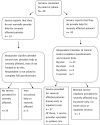What is the current NHS service provision for patients severely affected by chronic fatigue syndrome/myalgic encephalomyelitis? A national scoping exercise
- PMID: 24984956
- PMCID: PMC4078780
- DOI: 10.1136/bmjopen-2014-005083
What is the current NHS service provision for patients severely affected by chronic fatigue syndrome/myalgic encephalomyelitis? A national scoping exercise
Abstract
Background: Chronic fatigue syndrome/myalgic encephalomyelitis (CFS/ME), in its most severe clinical presentation, can result in patients becoming housebound and bedbound so unable to access most available specialist services. This presents particular clinical risks and treatment needs for which the National Institute for Health and Care Excellence (NICE) advises specialist medical care and monitoring. The extent of National Health Service (NHS) specialist provision in England for severe CFS/ME is currently unknown.
Objectives: To establish the current NHS provision for patients with severe CFS/ME in England.
Setting and participants: All 49 English NHS specialist CFS/ME adult services in England, in 2013.
Method: Cross-sectional survey by email questionnaire.
Primary outcome measures: Adherence to NICE guidelines for severe CFS/ME.
Results: All 49 services replied (100%). 33% (16/49) of specialist CFS/ME services provided no service for housebound patients. 55% (27/49) services did treat patients with severe CFS/ME and their interventions followed the NICE guidelines. The remaining services (12%, 6/49) offered occasional or minimal support where funding allowed. There was one NHS unit providing specialist inpatient CFS/ME provision in England.
Conclusions: Study findings highlight substantial variation in access to specialist care for patients with severe presentation of CFS/ME. Where treatment was provided, this appeared to comply with NICE recommendations for this patient group.
Keywords: Neurology; Primary Care.
Published by the BMJ Publishing Group Limited. For permission to use (where not already granted under a licence) please go to http://group.bmj.com/group/rights-licensing/permissions.
Figures
Similar articles
-
Investigating the effectiveness and cost-effectiveness of FITNET-NHS (Fatigue In Teenagers on the interNET in the NHS) compared to Activity Management to treat paediatric chronic fatigue syndrome (CFS)/myalgic encephalomyelitis (ME): protocol for a randomised controlled trial.Trials. 2018 Feb 22;19(1):136. doi: 10.1186/s13063-018-2500-3. Trials. 2018. PMID: 29471861 Free PMC article.
-
Understanding symptom clusters, diagnosis and healthcare experiences in myalgic encephalomyelitis/chronic fatigue syndrome and long COVID: a cross-sectional survey in the UK.BMJ Open. 2025 Apr 2;15(4):e094658. doi: 10.1136/bmjopen-2024-094658. BMJ Open. 2025. PMID: 40180399 Free PMC article.
-
Equity of access to specialist chronic fatigue syndrome (CFS/ME) services in England (2008-2010): a national survey and cross-sectional study.BMJ Open. 2012 Aug 16;2(4):e001417. doi: 10.1136/bmjopen-2012-001417. Print 2012. BMJ Open. 2012. PMID: 22899647 Free PMC article.
-
Review of Myalgic Encephalomyelitis/Chronic Fatigue Syndrome: an evidence-based approach to diagnosis and management by clinicians.Rev Environ Health. 2015;30(4):223-49. doi: 10.1515/reveh-2015-0026. Rev Environ Health. 2015. PMID: 26613325 Review.
-
A new look at chronic fatigue syndrome/myalgic encephalomyelitis.J Clin Pathol. 2007 Feb;60(2):120-1. doi: 10.1136/jcp.2006.042432. Epub 2006 Aug 25. J Clin Pathol. 2007. PMID: 16935965 Free PMC article. Review.
Cited by
-
Defining the prevalence and symptom burden of those with self-reported severe chronic fatigue syndrome/myalgic encephalomyelitis (CFS/ME): a two-phase community pilot study in the North East of England.BMJ Open. 2018 Sep 19;8(9):e020775. doi: 10.1136/bmjopen-2017-020775. BMJ Open. 2018. PMID: 30232103 Free PMC article.
-
Adult patients' experiences of NHS specialist services for chronic fatigue syndrome (CFS/ME): a qualitative study in England.BMC Health Serv Res. 2017 Jun 2;17(1):384. doi: 10.1186/s12913-017-2337-6. BMC Health Serv Res. 2017. PMID: 28576141 Free PMC article.
-
Hope, disappointment and perseverance: Reflections of people with Myalgic encephalomyelitis/Chronic Fatigue Syndrome (ME/CFS) and Multiple Sclerosis participating in biomedical research. A qualitative focus group study.Health Expect. 2019 Jun;22(3):373-384. doi: 10.1111/hex.12857. Epub 2019 Jan 10. Health Expect. 2019. PMID: 30632248 Free PMC article.
-
[Multimodal Treatment Strategies for Homebound Patients with Severe ME/CFS: A Scoping Review].Gesundheitswesen. 2024 Oct;86(10):614-624. doi: 10.1055/a-2323-4108. Epub 2024 May 10. Gesundheitswesen. 2024. PMID: 38729210 Free PMC article. German.
-
A Natural History of Disease Framework for Improving the Prevention, Management, and Research on Post-viral Fatigue Syndrome and Other Forms of Myalgic Encephalomyelitis/Chronic Fatigue Syndrome.Front Med (Lausanne). 2022 Jan 28;8:688159. doi: 10.3389/fmed.2021.688159. eCollection 2021. Front Med (Lausanne). 2022. PMID: 35155455 Free PMC article.
References
-
- National Institute for Heath and Care Excellence (NICE). Chronic fatigue syndrome/myalgic encephalomyelitis (or encephalopathy): diagnosis and management of CFS/ME in adults and children. NICE clinical guideline 53 London: National Collaborating Centre for Primary Care, 2007
-
- Burley L, Cox DL, Findley LJ. Severe chronic fatigue syndrome (CFS/ME): recovery is possible. Br J Occup Ther 2007;70:339–44
-
- Pheby D, Saffron L. Risk factors for severe ME/CFS. Biol Med 2009;1:50–74
-
- Department of Health. A Report of the CFS/ME working Group: report to the chief Medical Officer of an Independent Working Group. London: Department of Health; 2002.
-
- Essame C, Phclan S, Aggett P, et al. Pilot study of a multidisciplinary inpatient rehabilitation of severely incapacitated patients with the chronic fatigue syndrome. J Chron Fatigue Syndr 1998;4:51–60
Publication types
MeSH terms
LinkOut - more resources
Full Text Sources
Other Literature Sources
Medical


